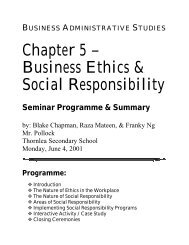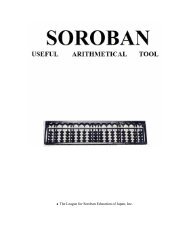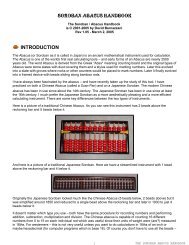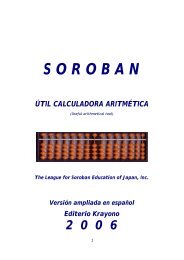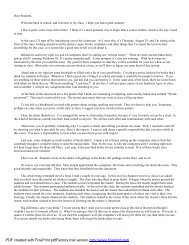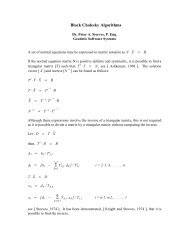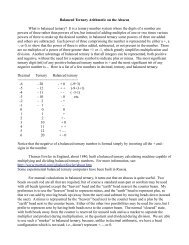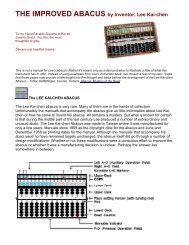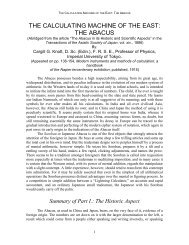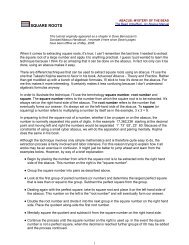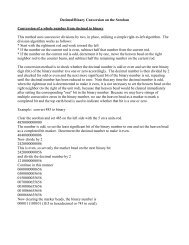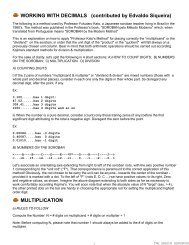Sexing Political Identities-Nationalism as Heterosexism.pdf
Sexing Political Identities-Nationalism as Heterosexism.pdf
Sexing Political Identities-Nationalism as Heterosexism.pdf
You also want an ePaper? Increase the reach of your titles
YUMPU automatically turns print PDFs into web optimized ePapers that Google loves.
– hence durability – of the written word, m<strong>as</strong>culinist élites were able to extend<br />
their authority and power across time and space, and this authority and power<br />
entailed élite conceptions of how the world works and who should be<br />
authoritatively in charge. Contemporary critical social theory recognizes that<br />
whose representations secure authority and sedimentation is an effect of<br />
power relations. The invention of writing (in the context of early state-making<br />
and under élite male control) structurally altered power relations by<br />
systemically enhancing state power – and the voices of state élites. Like all<br />
technological revolutions, the development of writing had multiple and<br />
complex effects. What I emph<strong>as</strong>ize here is how writing permitted state élites<br />
to ‘x’ or stabilize a historically particular symbolic ordering (and its<br />
corollary political ordering) <strong>as</strong> ‘given.’ Not only is a heterosexist symbolic<br />
order stabilized (not le<strong>as</strong>t, essentializing gendered dichotomies) but the<br />
political making of that historically contingent order is er<strong>as</strong>ed. In its place, the<br />
authority of durable texts ‘grounds’ heterosexism and its gendered binaries<br />
<strong>as</strong> foundational. An important point here is that the ‘symbolic’ power of<br />
the early state, though rarely the focus of analysis, is <strong>as</strong> signicant <strong>as</strong> the<br />
‘structural’ power of the state, which commands most of the critical attention.<br />
More accurately stated, the symbolic power of the state is rendered visibly<br />
structural through writing technologies. This is particularly important for<br />
feminist theory/practice insofar <strong>as</strong> it permits us to materialize (historicize,<br />
politicize) the symbolic order of gendered binaries that features prominently<br />
in feminist critiques (see note 10).<br />
Because this argumentation is unfamiliar, I attempt to further clarify it by<br />
reference to multiple ‘contracts’ that underpin western philosophy and political<br />
theory. I am arguing that the ‘heterosexual contract’ ((Wittig 1980) naturalizing<br />
binary gender identities and heterosexism), the ‘social contract’ (naturalizing<br />
centralized political authority, hierarchical social relations, and the transition<br />
from ‘pre-contractual’ relations <strong>as</strong>sociated with the state of ‘nature’ to contractual<br />
relations <strong>as</strong>sociated with ‘culture’), and language codication (the<br />
invention of writing, the articulation of western metaphysics <strong>as</strong> phallogocentric)<br />
are historically contingent and mutually constituted processes that<br />
constitute what we describe <strong>as</strong> early state-making. Moreover, this mutuality<br />
is not ‘simply’ a conceptual linkage (e.g. between symbolic constructions of<br />
m<strong>as</strong>culinity, heterosexuality, contract, and stateness) but a historical, empirical,<br />
and ‘structural’ linkage that is visible through a genealogical feminist lens on<br />
early state-making, its technologies, and its interpretive productions. These<br />
linkages are structural in two interactive senses: both <strong>as</strong> historical-empirical<br />
material practices and institutions (the more conventional sense of social<br />
structures), and <strong>as</strong> signifying/meaning systems, knowledge claims, and enduring<br />
narratives that produce even <strong>as</strong> they are produced by material structures.<br />
Stated differently, in early state-making the interaction of (gendered) signifying<br />
processes and structural dynamics produces both conceptual and political<br />
codications, with particularly powerful and durable effects.<br />
These effects are visible in subsequent modern state-making (and<br />
42 International Feminist Journal of Politics




